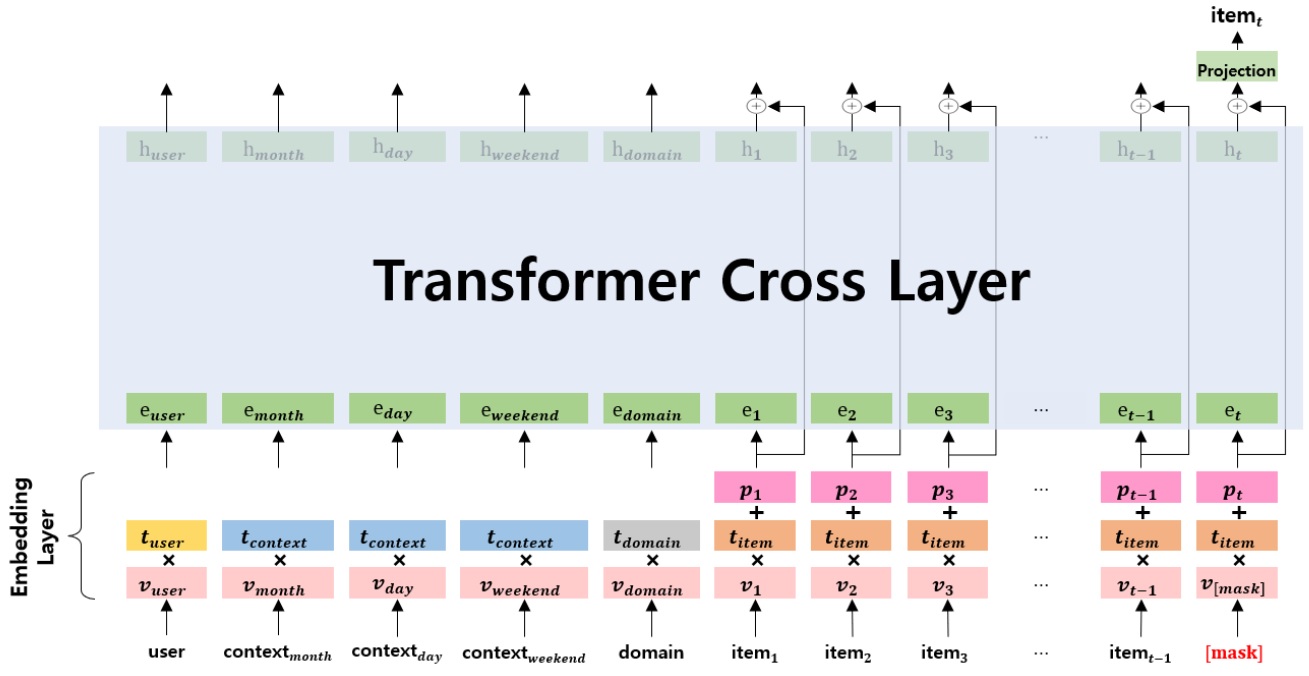We present CART, a novel transformer-based recommendation system specialised in offline retail environment and developed by a collaboration between NS Lab, CUK and IIP Lab, Gachon University based on pure PyTorch backend.

The overall architecture of Community-aware Graph Transformers.
Over the years, Recommendation systems have been widely employed across diverse tasks to offer hyperpersonalized services considering users’ unique preferences and past behaviors. However, existing recommendation systems may be less suited for edge-computing settings because of their high computational costs and numerous parameters. In this work, we propose a novel kiosk recommendation system (CART) that involves (i) self-supervised learning based on contextual information in offline retail environments and (ii) representation learning of user behaviors based on contextual information. The proposed model uses self-supervised learning to learn user propensity, contextual information, and domain attributes from offline retail. We propose three selfsupervised learning tasks: (i) learning user propensity through transactions, (ii) learning domain characteristics through item purchases, and (iii) learning contextual information through user propensity and behavior. After pre-training with the three tasks, the proposed model was fine-tuned to focus on specific user behaviors based on contextual information. We also evaluated the quality of items recommended by the proposed kiosk recommendation system using the transactions of a real kiosk system. As a result, MAP@3 was improved by 29.1% compared to the existing recommendation system.
A short description of CART:
- We propose a state-of-the-art kiosk recommendation system (CART) that utilizes self-supervised learning techniques tailored to kiosks in an offline retail environment. The model effectively captures user behavior and contextual information to enhance the item recommendation performance and learning efficiency.
- The proposed CART model demonstrated a significant improvement in performance metrics, outperforming existing sequential recommendation systems. Specifically, it exhibits a 28.8% improvement in MAP @3 and a decrease in standard deviation by 0.069 when compared to Albert4rec. Furthermore, the model achieves a 0.088 improvement in HIT @10 and a 0.015 improvement in NDCG@10.
- We present hypotheses concerning various locations for kiosk recommendation systems and validate their effectiveness in constructing efficient recommendation systems for the offline retail market. The experimental results substantiate the potential of our proposed methods for addressing the challenges faced by kiosk recommendation systems in diverse environments.
The CART is available at:
Cite “CART” as:
Please cite our paper if you find CART useful in your work:
@article{jung2024kiosk,
title = {Kiosk Recommend System Based On Self-Supervised Representation Learning of User Behaviors in Offline Retail},
author = {Nam Gyu Jung and Van Thuy Hoang and O-Joun Lee and Chang Choi},
journal = {IEEE Internet of Things Journal},
title = {Kiosk Recommend System Based On Self-Supervised Representation Learning of User Behaviors in Offline Retail},
year = {2024},
issn = {2372-2541},
note = {To Appear},
doi = {10.1109/JIOT.2024.3365144},
publisher = {Institute of Electrical and Electronics Engineers (IEEE)},
![]()
![]()
![]()
![]()
![]()
Contributors
Contributors: @Namgyu97 and @BWAAEEEK



